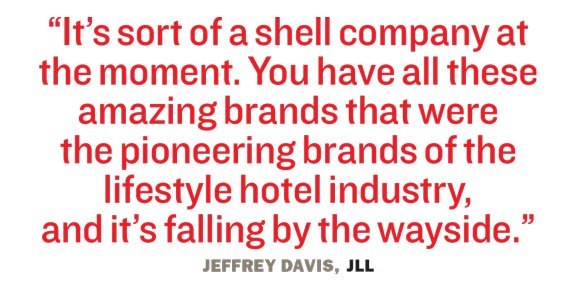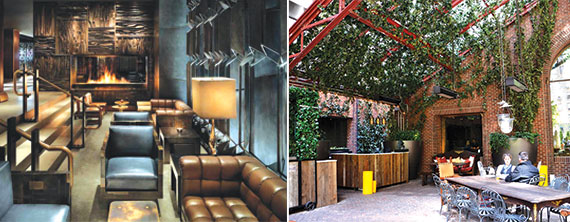UPDATED, May 10 at 10:05 a.m.: SBE Entertainment Group has struck a deal to acquire Morgans Hotel Group for $2.25 a share.
Morgans Hotel Group is, perhaps, most associated with its co-founder and Studio 54 impresario Ian Schrager, who headed the hospitality company until about a decade ago. Four other Morgans’ heads have come and gone since then. But today the company’s CEO office sits empty.
And that’s not the Morgans’ only problem. The small but storied boutique company is floundering in a way that few would have expected just a few years ago. Not only is it lacking a leader, its stock price is in the toilet at just north of $1 a share, it’s saddled with debt and its stakeholders are at one another’s throats.
“It’s sort of a shell company at the moment,” said Jeffrey Davis, an international director at JLL’s Hotels & Hospitality Group who served as Morgans’ vice president of asset management and business development under Schrager.
“You have all these amazing brands that were the pioneering brands of the lifestyle hotel industry, and it’s falling by the wayside,” he said.
The company — which manages 13 hotels worldwide including the Mondrian in Miami, Los Angeles and London and the Delano in Miami and Las Vegas — has fallen behind rival brands like the Ace Hotel, Starwood’s W Hotels and Marriott’s Edition, which Schrager helped launch.
“It’s a company that has been treading water, with no innovation,” Davis said.
So how did it get to this point and can its stakeholders — which include billionaire supermarket magnate Ron Burkle — put their differences aside and get the company back on track?
‘Public’ disappointment
In 1984, Schrager and his Studio 54 partner Steve Rubell opened the first Morgans Hotel on 37th Street and Madison Avenue.
The management company was credited with pioneering the boutique and lifestyle hotel sector that today represents a $6.6 billion market in the U.S.
But Morgan’s own valuation has sunk to $52 million after peaking at $800 million in 2007. The company also has more than $500 million in debt.
Some say that Morgans’ issues can, at least partially, be traced back to the fact that it went public in 2006 under Schrager’s successor, Ed Scheetz.
While Schrager — who stepped down in 2005 just before the $300 million IPO — did not respond to requests for comment for this story, in 2014 he told Bloomberg News that he was at odds with his partners about going public. “I walked away,” he said. “I enjoyed creating the hotels. I didn’t really want to run a public company.”
 And Ryan Meliker, a hotel analyst, told the Wall Street Journal in 2013 that Morgans “should not be a public company.”
And Ryan Meliker, a hotel analyst, told the Wall Street Journal in 2013 that Morgans “should not be a public company.”
“It is way too small a company to be public and have public operating and reporting costs,” he said.
Regardless of where its problems originated, its main stakeholders have been in complete and utter disagreement about how to proceed. In fact, its two largest stakeholders — Burkle, the 63-year-old private equity founder and preferred stockholder, and
Jason Kalisman, the 37-year-old grandson of the late real estate mogul Alfred Taubman — have completely different visions for what to do to salvage the brand.
“All the oars are moving in different directions,” said Kim Opiatowski, a hotel analyst at brokerage firm Oscar Gruss.
‘Spoiled child’
Burkle and Kalisman have locked horns since 2013, when Kalisman thwarted a deal by Burkle that would have given the billionaire ownership of the Delano and other Morgans assets. Burkle, in turn, wrote a letter to board members that likened Kalisman to “a spoiled child” who was “playing with the company as though it’s your new toy.”
But perhaps their biggest fallout came last November, when Morgans was headed for a merger with Los Angeles hotelier Sam Nazarian’s SBE Entertainment Group.
The deal would have bolstered Morgans’ books, creating a new company with a reported market capitalization of $260 million and 19 hotels under management.
As part of the agreement, Burkle would have acquired two Morgans hotels — the Hudson New York in Midtown and the Delano South Beach — valued at a combined $590 million. He would also become chair of the new merged entity.
But the deal derailed.
Sources with knowledge of the almost-merger told The Real Deal that numerous stakeholders — including Morgans’ consultant Morgan Stanley — supported the transaction. Under the terms of the deal, Morgans would have continued to run the hotels with contracts valued at between $60 million to $70 million.
Moreover, Burkle agreed to give up his estimated $130 million preferred equity stake in the company, which included extensive veto rights over sales and acquisitions. (The billionaire provided Morgans with a $75 million cash injection after the 2008 global financial crisis and the company’s disastrous $770 million purchase of the Hard Rock Hotel & Casino in Las Vegas, where it partnered with Credit Suisse.)
But Kalisman, who served as CEO between 2013 and 2015, believed the deal gave Burkle too much. At the eleventh hour, he killed the merger by convincing a large shareholder, Pine River Capital Management, to oppose it.
Neither Burkle nor Kalisman returned requests for comment for this story. Representatives for Morgans, SBE and Pine River declined to comment.

The Royalton and The Hudson New York
Still, Andrew Walker, a portfolio manager at the New Canaan, Conn.-based Rangeley Capital who’s written about Morgans in published analyst notes and owns a small position in the company, said it’s “so clear” Morgans should not be a public company. But, he said, it may have missed its window to be sold.
“Last year was kind of the year to do it. The New York hotel market was so hot,” he said.
Proposals rebuffed
That might have been the thinking of another Morgans investor, Gregory Cohen, who began penning letters to the board last year, citing “serious concerns” about the company’s direction.
“It seems as if the board’s strategy is to let the business float along — without a plan — with no regard for shareholder value,” Cohen, whose company Rambleside Holdings owns roughly 5 percent of Morgans’ shares, wrote in February 2016.
In September, as merger talks with SBE were already underway, Cohen offered to buy the Hudson New York and Delano South Beach for $507 million. He even offered to buy all of Morgans.
He also nominated Fred Kleisner — who served as Morgans’ CEO from 2007 to 2011 — to step in to head the firm again.
“This is a company that needs, first and foremost, optimism and confidence in those at the top,” Kleisner told TRD. “That can happen literally overnight.”
In a statement to TRD, Cohen said his firm has offered the company help in navigating its situation but has been rebuffed.
“Not only has the board refused our help, they have yet to hire any senior leadership or provide a meaningful strategic update to shareholders in over six months,” Cohen said. He added: “This is not a responsible way to lead a public company.”
A ticking clock
In December, Morgans hired hotel brokerage Hodges Ward Elliot to market both the Hudson New York and Delano South Beach.
But with so much uncertainty about the company’s future, Morgans’ stock has continued to fall. In the middle of last month, it stood at around $1.50 per share.
Meanwhile, the company reported a 6 percent decline in total revenues in 2015 and last year lost the management contract on its prized Mondrian Soho in New York — reportedly worth more than $1 million annually — after a contentious battle with Alex Sapir and Rotem Rosen. (Morgans sued the duo and subsequently received $10 million in a settlement.)
While sources say SBE is still open to a merger with Morgans, the deal seems unlikely given Morgans’ current dysfunction.
In a March earnings call, Morgans officials said that company has interviewed “a number of highly qualified candidates” to take the CEO spot.
JLL’s Davis said the company can’t let the spot sit vacant for much longer. He said for a company that kicked off the boutique hotel craze, Morgans could be doomed by its lack of strategy for the future.
“That would be my biggest fear — a company that started all of this fell by the wayside because nobody had the fortitude to find a vision,” Davis said.
